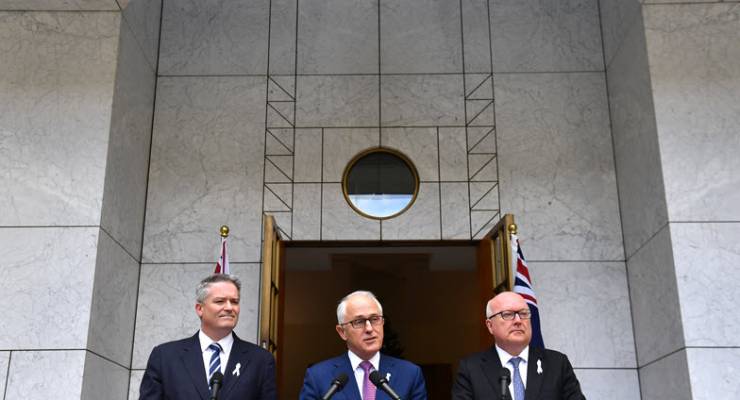
Now that legislation has been put forth that would seek to curb – if not eradicate – the influence of foreign interference in Australia’s political processes, it might not be a bad idea to define what that defines.
Would all lobby groups involved in seeking traction in the political process come under the purview of the new legislation. This is a potential minefield — and potentially a lawyer’s picnic.
What is certain is the government of the day — Labor or conservative — will have difficulty deciding exactly what constitutes foreign money and its influence entering the Australian political mainstream.
Decisions would have to be made, under a new foreign donations law, about the nature of organisations, seeking to influence the political process.
The progressive political action group GetUp has been singled out for attention by the government, but what about other organisations, like the Institute of Public Affairs, which also seek to influence the political process?
What about its sources of funding, or that of any one of a number of such groups? The IPA, for example, opposed the plain-packaging legislation for cigarette cartons on libertarian grounds.
A reasonable question might be asked whether that organisation received — or receives — funding from the tobacco industry, all of which is foreign-owned.
What about corporations like Rio Tinto with large Australian shareholdings and mining operations in Australia, but whose headquarters are located elsewhere.
In Rio’s case, it is London. Would that company be regarded as a foreign donor under the new law if it sought to provide political donations to players in the Australian political process?
There are other such examples.
What should now happen, regardless, is that all players involved in lobbying activities that might gain traction in the political debate be required to publish their donors’ lists.
That includes both GetUp and the IPA among other such organisations.
Flushing out sources of funding for these groups, including think tanks that have mushroomed in recent years, should be a priority.
In this regard, the government might take the lead from America where laws require funding for think tanks, lobby groups and others involved in the public debate be exposed.
Thus, we know, for example where the money comes from to fund the activities of the liberal Brookings Institution or the conservative Heritage Foundation, or any one of a plethora of such institutions.
This brings us to the specific question of Chinese money entering the Australian political mainstream. In this context the question might be asked are we just talking about donations to political parties themselves, or tangentially to organizations involved in the public debate more generally?
The argument could be made that almost any intervention in the public debate on virtually any subject is seeking to influence Australia’s political processes.
These are massive grey areas.
In the first instance attention will focus inevitably on China’s lobbying activities either by way of political donations from wealthy Chinese, or indirectly from the Chinese government via its various front organisations.
In its October 25 edition, the Financial Times published an extensive account of the work of the United Front Work Department (UFWD) of the Chinese Communist Party.
This is the “soft power” agency of the Chinese government that seeks to influence political processes around the world in the service of the Chinese state.
Until recently, Huang Xiangmo — the Chinese billionaire whose political donations to both sides of politics have singled him out for attention – was chairman in Australia of the Australian Council for the Promotion of the Peaceful Reunification of China (ACPPRC).
Either formally or informally the ACPPRC would be linked with the UFWD in what’s described as “united front work” to promote China’s interests around the world.
Huang, for example, has been a generous donor to various academic institutions in Australia, including the Australia-China Relations Institute (ACRI) under the leadership of former foreign minister Bob Carr.
This institute resides at the University of Technology, Sydney. The fair judgement is that ACRI is sympathetic to Chinese interests. There are other examples of substantial donations from wealthy Chinese to Australian universities.
None of this money is being provided without an implicit understanding that recipients will take a fairly benign view of China’s activities.
Underscoring the importance to Beijing of united front “soft power” work is that China’s supreme leader Xi Jinping has recently added direct oversight of the UFWD to his expanding list of responsibilities.







I wonder what’s going to happen when the first donation is made with BITCOIN!
That ship has sailed – governments have Bitcoin accounts now (yes, ours too).
They always hedge in currencies, just in case.
George and Malcolm have Bitcoin covered. Remember that the Laws of Mathematics are subservient to the Laws of Australia.
RED
Thats an extraordinary leap of faith to believe that any lobbing money will be rejected. All the money will be from the ‘local’ subsidiary.
The simple answer is it will be designed to target their political enemies and exempt their political friends. In case you hadn’t realised it by now, this is the sole operating “principle” of this government.
The “national interest” simply won’t come into it. This is the same government that told us all opposition to ChAFTA was “racist” and was preparing to pass an extradition treaty with China, remember?
I wonder if NewsCorp and the Murdochs will need to register? Neither the company nor Murdoch Snr are Australian, after all.
Nooo!
The Minerals Council has had significant input to this proposal to include NGOs. It continues conservative government attacks on civil society advocacy. I’ve tried to describe here goo.gl/jWLqqt